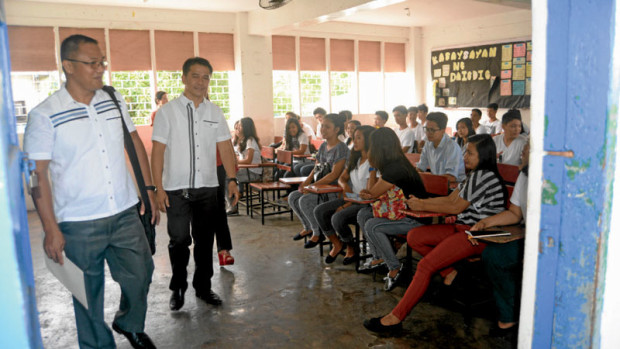Facilities up but where are the senior students?

Schools officials inspect K 11 students in Guitnangbayan 1 San Mateo, Rizal high school during the openinng day of senior high school. ROMY HOMILLADA
“WE HAVE prepared the facilities, adjusted to the K-12 requirements, but the students are not there. They have not yet enrolled.”
That’s the lament of Rita Riddle, schools division superintendent of Caloocan City.
Even with the government assistance worth P22,500 for the public school students, parents have chosen not to enroll their children in the Department of Education’s (DepEd) two-year senior high school program beginning this school year.
Those joining state universities get a cash grant of P11,500 or P18,500 if they chose private universities.
As of last weekend, 11,152 had enrolled in Grade 11 in the city out of an expected 20,199 students—1,768 registered in public high schools, 8, 020 in private schools, 1,329 in higher education institutions, and 35 in local universities and colleges.
Article continues after this advertisementOther usual problems at the opening of the school year persisted elsewhere.
Article continues after this advertisement2 shifts
In Albay province, the shifting of classes was the only applicable solution to accommodate thousands of students returning to school, especially in areas where classrooms remained unfinished.
Gemma Saberon Sapo, principal of Marcial O. Ranola Memorial School in Guinobatan, said officials were left with no choice but to divide their 6,000 students in morning and afternoon shifts due to the shortage of classrooms.
She said class size would be between 50 and 60 students.
“While a crowded room is not really conducive to learning, we will make necessary adjustments as long as the school building for senior high is finished,” Sapo said.
She said the delayed delivery of instructional materials and the shortage of teachers in senior high school were among the problems they encountered this year.
In Sorsogon province, at least 56 schools had to use makeshift classrooms made of lumber, plywood and galvanized iron roof. DepEd spokesperson Joseph John Perez said 134 of these structures were used on the first day of classes in the towns of Barcelona, Bulan, Bulusan, Casiguran, Castilla, Donsol, Gubat, Irosin, Magallanes, Matnog, Pilar, Prieto Diaz and Santa Magdalena. These towns were badly hit by Typhoon “Nona” in 2015.
At least 1.6 million students were expected to attend elementary and secondary schools in the six provinces in the region, the DepEd said.
The figure was 9.38 percent higher than the 1.5 million students enrolled last year due to the first batch of students entering Grade 11.
In Baguio City, public schools took in 946 senior high students on Monday. The rest of the 6,100 Grade 11 students enrolled in senior high school programs offered by private schools.
Adjustments
Education Undersecretary Alberto Muyot said universities and colleges have developed their own senior high school programs, hoping to encourage senior high school graduates to pursue college in their schools.
Muyot also said problems continued to hound the senior high school opening but said the DepEd had made adjustments to address delays in the construction of classrooms and buildings and the late deployment of teachers.
Only two senior high school buildings have been completed in time to receive Baguio’s first batch of senior high school students. But only San Vicente National High School is ready to serve them.
Baguio needs 38 teachers for the senior high school program but only 24 were hired in June to serve the teaching load for the first semester. With reports from Leo Udtohan, Nestor P. Burgos Jr., Carla P. Gomez and Joey A. Gabieta, Inquirer Visayas; Kimberlie Quitasol, Inquirer Northern Luzon; Anselmo Roque, Inquirer Central Luzon; Mar S. Arguelles, Michael B. Jaucian and April Mier, Inquirer Southern Luzon